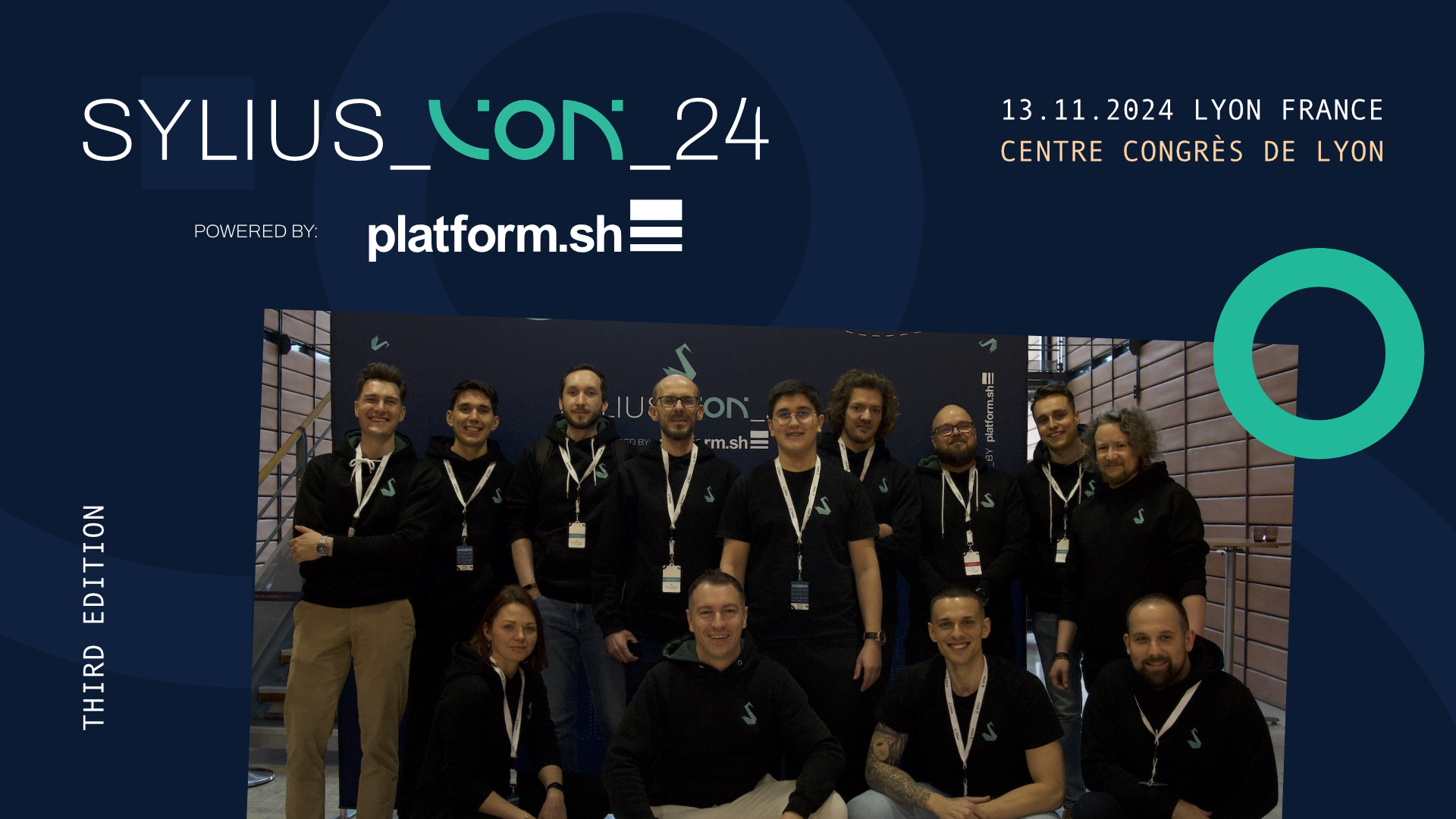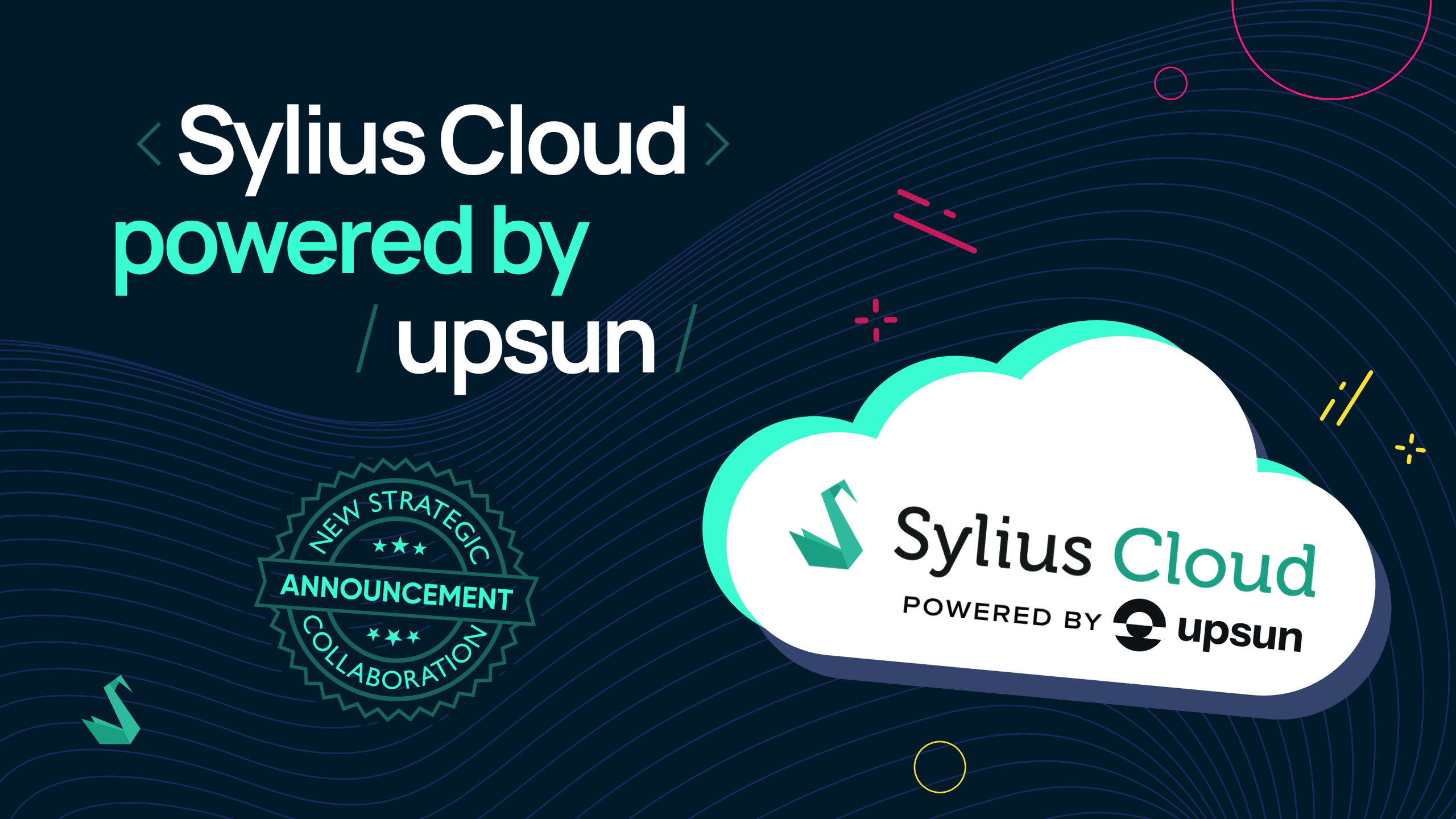Welcome to the summary of October! This month belonged to SyliusCon – our biggest community gathering of the year, which brought together 150+ attendees in Lyon to celebrate what we’ve built and explore where we’re heading next. But the momentum didn’t stop there. From impressive new Sylius implementations across diverse industries to launching Elesto (our B2B project accelerator) and partnering on the first comprehensive B2B eCommerce report in years, October showed just how much energy our ecosystem has right now.
Here’s a breakdown of October’s highlights:
October 2025 delivered another month of progress across the Sylius ecosystem: cleaner builds, safer testing, more flexible forms, and continued modernization across all extensions.
As we move toward the Sylius 2.2 release, we’re doubling down on developer experience, quality, and cross-version compatibility – building the most stable and extensible Sylius yet.
Sylius Core
In the Sylius Core, October was all about ensuring compatibility and long-term maintainability. Continuous Integration was heavily updated: the test matrix now includes Symfony 7.4 beta across all databases (#18480), while outdated Doctrine ORM versions with known regressions were proactively blocked to prevent runtime errors (#18479).
A large round of CI optimizations followed – updating BuildTestAppAction to v3.0.1 (#18441, #18459), fixing Panther test Chrome directory conflicts, and stabilizing LiveComponent-based Behat tests by aligning with proper data-live-is-loading attributes (#18448). Together, these changes significantly reduce CI flakiness and improve test reproducibility.
Maintenance and cleanup continued at scale: ECS formatting and duplicate test files were cleaned up (#18449, #18450), and PhpStan warnings were addressed (#18458). CI was also aligned to focus on Sylius 2.2 builds and reduce matrix load (#18431).
From a user and developer perspective, several visible improvements landed. The checkout flow was enhanced with a fix for clearing the cart after adding an address (#18427), a new mechanism for address form modifiers allowing plugin-based address data enrichment (#18410), and multiple bug fixes in zone eligibility (#18411).
We also introduced a reusable Twig loader helper (#18367) for consistent loading animations across Admin and Shop UIs and fixed several regressions, including duplicate product images (#18380, #18394), breadcrumbs on Customer Orders (#18368), and invalid translation property types (#18399).
Finally, the internal documentation synchronization was streamlined: the old /docs directory was removed, and documentation contribution was moved to the dedicated Sylius/Documentation repository (#18428).
October brought another series of improvements to Sylius Stack, especially around documentation and accessibility. The BootstrapAdminUi gained a polished footer (#303), documentation updates for CRUD template integration (#301), and new guides on resource lifecycle and resource configuration (#299). Additional UX refinements included fixing the speaker autocomplete widget and updating menu structures in the docs (#305).
The Stack documentation now better reflects modern Sylius best practices and continues evolving as the central source for Admin UI and Resource-based development.
The SyliusGridBundle had one of its biggest updates this year. Support for Symfony 7.4 beta was added, while Symfony 7.0, 7.1, and PHP 8.1 were dropped (#433). It also gained a new compiler pass that validates grid driver availability during container compilation, preventing runtime errors. Static analysis and documentation were cleaned up with PhpStan and PHPDoc improvements (#428, #438). Other highlights include improved enum support for grid fields and filters (#407) and a new callable service integration for field types.
The Sylius Standard Edition saw a technical refresh focused on environment stability and future-readiness.
It now supports PHP 8.3 by default (#1172), includes lock files for consistent Docker builds (#1171), and fixes FPM initialization issues on WSL2 (#1177).
The standout addition is full Upsun Flex support, along with upgrades to PHP 8.4 and MySQL 11.8 (#1170), giving merchants the flexibility to deploy on both Upsun Flex and Upsun Fixed environments. CI was also updated to align with these new runtime versions.
Our payment ecosystem continued to grow stronger and more unified.
All official PSP integrations – Adyen, Mollie, and PayPal – remain part of Sylius’ open-source funding model. Every project using these integrations helps sustain the Sylius Community Edition, as 100% of revenue from PSP partnerships is reinvested back into open source development. Thank you for supporting Sylius by using these plugins 🫶
The Adyen Plugin saw major refinements for stability and merchant experience. Several checkout edge cases were fixed, including handling skipped shipping or payment steps (Adyen #166), variant change handling (#145), and province validation in API-based checkout (#165). Admin UI was enhanced with clearer refund visibility and commodity code management (#149, #147), while overall DX was improved with simplified configuration, new trait annotations, and cleaner templates (#156, #157, #158, #161).
The Mollie Plugin introduced multiple DX and UX enhancements. Admin navigation was simplified by moving Mollie sections under the Payment Methods index and refining menu structure (Mollie #270). Repositories were unfinalized to improve extensibility (#276), and several configuration and test-mode inconsistencies were fixed (#273).
For the PayPal Plugin, work focused on checkout reliability and developer control. Express checkout gained proper handling of locale configuration (PayPal #406, #402), performance during payment retrieval was improved (#392), and partial refunds and cancellation logic were hardened (#401,#391). Sandbox configuration validation was also added for safer testing (PayPal #407).
Together, these changes further solidify Sylius as a secure, open, and fully extensible payments platform – built on community-driven innovation.
The Invoicing Plugin received a new Behat scenario ensuring invoices aren’t generated for orders without numbers (Invoicing #396), as well as documentation updates linking to our new GitBook (Invoicing #388).
The Refund Plugin also had its documentation refreshed and migrated to the centralized GitBook format (Refund #478), ensuring consistency across all official extensions.
The fourth edition of SyliusCon is behind us! This year, the second home of Sylius – Lyon, and one of the most vibrant open-source communities. We gathered 24 speakers, 14 sponsors, and over 150 attendees to celebrate eCommerce innovation, open-source collaboration, and the human connections that make Sylius truly unique.
The dual-track format served both technical implementation and business strategy needs perfectly. The technical track delivered actionable insights on performance optimization, AI integration strategies, advanced Sylius Grid techniques, cloud infrastructure, and API Platform developments. Meanwhile, the business track explored SaaS growth strategies, marketplace evolution, and featured engaging discussions on CMS solutions that sparked exactly the kind of conversations we hoped for.
The day before the main event, Gracjan Józefczyk led a comprehensive Sylius Practical Workshop, guiding developers through four focused stages, from core architecture to plugin development. It was the perfect warm-up for those looking to master Sylius or start building custom eCommerce solutions.
What stood out most? The conversations. Whether at the booth discussing implementations, during coffee breaks exchanging ideas about headless commerce, or at evening events where colleagues became friends, SyliusCon 2025 proved once again that our community’s strength lies in the connections we build.
Thank you to everyone who made this event unforgettable – speakers who shared their expertise, sponsors who supported the community, and every attendee who brought energy and curiosity to Lyon. 🫶
Read the full SyliusCon 2025 recap with photos, speaker highlights, and key points from both tracks.
We launched Elesto, a fully functional B2B demo that serves as a project accelerator for teams building complex business-to-business platforms. Rather than starting from scratch every time, Elesto provides a production-ready foundation with all the essential B2B features already implemented and working together seamlessly.
This isn’t just a simple demo – it’s a complete B2B environment showcasing organization management, multi-level user hierarchies, custom pricing structures, quick order functionality, and advanced catalog search. Every feature has been carefully built to demonstrate how real-world B2B scenarios should work in Sylius, from handling bulk orders to managing company-wide approval workflows.
For agencies and development teams, Elesto dramatically reduces the discovery and implementation phase of B2B projects. Instead of explaining how features should work in theory, you can show clients a working platform and start customizing from there. For businesses evaluating Sylius for their B2B needs, it’s the clearest way to see what’s possible without committing to a full implementation first.
Explore Elesto live and see how modern B2B eCommerce can operate 🚀
Sylius is increasingly recognized as the flexible eCommerce platform for complex B2B companies in Poland – and the latest data confirms why. We’re proud to be the Main Partner of the new Tpay report “E-commerce B2B. Appetite for Growth” – the first comprehensive look at this segment after a several-year break.
Based on insights from over 250 companies, the report reveals how the line between B2C and B2B is blurring, and how the B2B slice of the eCommerce cake is getting bigger every year. With over 40 pages of data, expert opinions, and real-world examples, it’s an essential read for anyone shaping the future of online business in Poland.
Polish B2B commerce is hungry for growth, and companies need flexible, future-ready platforms to stay competitive. That’s exactly where Sylius makes a difference.
Download the full report for free and see what’s driving B2B digital transformation in Poland.
Let’s take a closer look at the newest Sylius-based projects.
WEEBY, leveraging its expertise as a Sylius Premium Solution Partner, helped Gruchy Combustibles modernize its digital operations with a tailored eCommerce platform built on Sylius! This French heating fuel distributor with over 50 years of experience was struggling with its previous PrestaShop system, which couldn’t handle the company’s multi-warehouse logistics and regional delivery zones.
WEEBY stepped in to design a fully customized, headless Sylius solution – complete with a delivery configurator, real-time stock synchronization, and seamless integrations with tools like Logimatic and Mapotempo. The result? Gruchy now operates a fast, reliable, and scalable platform perfectly aligned with its complex logistics model, ensuring customers enjoy a smooth, location-aware shopping experience.
👉 sylius.com/case-study/gruchy-combustibles-heating-fuel-delivery
MVSoft just launched a brand-new Sylius 2 store for UnixPrint! This webshop is fully integrated with their external system, enabling seamless synchronization of products, brands, inventory, variations, and more. The implementation shows how Sylius 2 handles real-world integration challenges while delivering a smooth, efficient, and future-ready eCommerce experience for businesses that need their platforms to work perfectly with existing infrastructure.
From a rigid legacy system to a flexible Sylius-powered ticketing platform – Tisséo Voyageurs, the company behind public transport in Toulouse, needed a modern, scalable way to manage online ticket sales and subscriptions for 125M+ yearly journeys. Their old system made it hard to handle complex fare rules, user types, and integrations with internal tools.
With Sylius’s flexibility and Symfony-based architecture, the team could automate complex pricing and eligibility rules, simplify the user journey for buying and topping up tickets, integrate seamlessly with back-office systems and APIs, and stay on budget while delivering on time. The project wouldn’t have been such a success without exceptional expertise and project management from our long-standing partner EMAGMA. Now, Tisséo runs a modern, user-friendly eCommerce platform for public transport – proof that Sylius works far beyond traditional retail. 👉sylius.com/case-study/transportation-industry-on-sylius
Arobases shared a new case study showing how they approach eCommerce refontes with Sylius — replacing outdated, restrictive systems with a modern, flexible setup. Their latest project highlights how Sylius helps teams fix performance issues, improve SEO foundations, modernize the back office, and deliver custom features without CMS limitations. A clear example of using Sylius as a scalable foundation for rebuilding an online store. 👉 Read the full case study (FR): arobases.fr/refonte-ecommerce-sylius/
Autumn continues to bring exciting opportunities to meet us and our partners across Europe. Mark your calendars for these upcoming events!
We’re heading to Amsterdam on November 27-28 as a Gold Sponsor of SymfonyCon 2025! This is one of the most important gatherings in the Symfony ecosystem, and we couldn’t be more excited to be part of it.
You’ll find us at our booth throughout the conference, ready for great conversations about Sylius, headless commerce, API-first architecture, and whatever else sparks your interest. Whether you’re curious about Sylius, already building with it, or just want to chat about the future of eCommerce on Symfony – stop by and say hi!
Our team will be there: Patryk, Gracjan, Marc, and Jakub are looking forward to meeting you. Plus, we’ll have some special goodies at the booth – including Sylius elePHPants! 🐘
See you in Amsterdam! 🇳🇱
On November 20, the E-commerce B2B Conference returns to Warsaw for another edition focused on wholesale digitization and B2B platform strategies. Organized by Promedia Jerzy Osika, this event brings together manufacturers, distributors, and wholesalers looking to modernize their business-to-business operations.
As a Strategic Partner, we’ll have a consulting booth where you can discuss your B2B eCommerce challenges and explore how Sylius handles complex wholesale scenarios. Przemysław Połeć from Sylius and Radosław Żurawski from BitBag will present on B2B eCommerce customization, covering real-world implementation challenges and when it makes sense to invest in dedicated solutions versus standard platforms.
Sounds interesting? Meet us there!
Here are the newest articles from August.
And here’s a recap of social media discussions from last month.
The SyliusCon 2025 edition sparked a wave of enthusiasm across the community ❤️
MailchimpPlugin and SyliusAnalyticsPlugin released by Jaroslav Týc
The Sylius community didn’t stop at posts and articles – several members also shared fantastic video content this month!
Stay tuned – our own Sylius videos are also coming soon! 🦢
What a month! SyliusCon 2025 delivered everything we hoped for and more – meaningful conversations, practical insights, and the kind of connections that remind us why this community is so special. Beyond Lyon, we celebrated real-world implementations solving complex logistics, transportation, and B2B challenges, while launching tools like Elesto that make building on Sylius faster and more accessible.
As we head into the final stretch of 2025, November brings exciting opportunities to connect at SymfonyCon Amsterdam and E-commerce B2B Conference in Warsaw. The energy from October carries forward, and we’re more convinced than ever that flexible, open-source commerce is exactly what the industry needs.
As always, thank you for being part of this journey.


